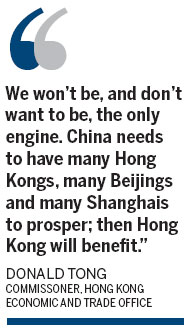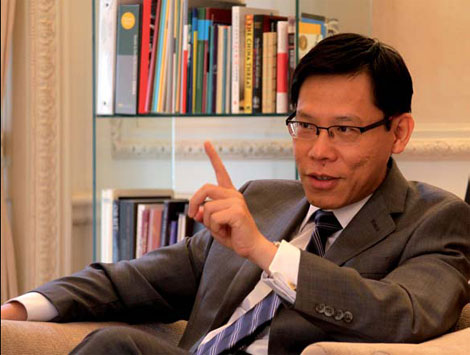Economic envoy sells US on HK as business hub
Updated: 2012-06-29 11:02
By Tan Yingzi in Washington and Chen Jia in San Francisco (China Daily)
|
||||||||
Editor's note:
July 1 is the 15th anniversary of the return of Hong Kong to China from British rule. Since 1997, the vibrant city has continued to prosper while maintaining significant political and economic autonomy through the Chinese government's "one country, two systems" policy. Hong Kong's stature as a global financial center has been recognized by the banking industry. China Daily USA talks to some renowned US-based bankers as well as the special administrative region's top representative in Washington for their take on what makes Hong Kong tick.
|
Donald Tong, head of the Hong Kong Economic and Trade Office in the US, considers China's "one country, two systems" policy the "cornerstone" of continued prosperity in the region. Sun Chenbei / China Daily |
In the 15 years since Hong Kong was returned to China, the region has forged closer economic relations with the United States, says the region's representative on this side of the Pacific.
"The trade relationship benefits significantly from the 'one country, two systems' principle," Donald Tong, head of the Hong Kong Economic and Trade Office, told China Daily in Washington.
Tong's official title is Hong Kong commissioner for economic and trade affairs to the United States, making him the region's most senior official in North America. He directs his government's promotion of bilateral trade and investment and oversees three offices - in Washington, where he works; New York; and San Francisco.
"One country, two systems," developed by Chinese leader Deng Xiaoping in the 1980s, is the policy whereby the People's Republic of China grants Hong Kong the ability to continue its highly autonomous political and economic structures for at least 50 years after reunification, which took place in 1997.
Tong calls the policy "the cornerstone of Hong Kong's achievements" over the past decade and a half.
The city, now a special administrative region under Chinese law, retains most of what was established during British colonial rule, including distinct immigration, customs, currency, legal and taxation systems.
Hong Kong also enjoys strong trade relations with the Chinese mainland through the Closer Economic Partnership Arrangement, or CEPA. The free-trade pact gives 47 sectors, including logistics, financial services and legal services, preferential access to the mainland market. In addition, goods of Hong Kong origin can be exported to the mainland free of tariffs.
With its strict laws protecting intellectual property, Hong Kong is well-suited to technology businesses engaged in innovation.

"If you look for R&D, financing or regional headquarters, you'll find that Hong Kong is a very convenient place," Tong said. The region's low tax rates, strategic location and legacy of British common law are highly attractive to US companies, he pointed out.
Thanks to the mainland's fast economic growth and the special status of Hong Kong, the southern region of 7 million people has seen its economy more than double in size over the past two decades. Gross domestic product is currently averaging 4 percent annual growth, adjusted for inflation, and an unemployment rate of 3.2 percent, the commissioner said.
Tong, who was born in the city, graduated from the Chinese University of Hong Kong and, in 1983, joined the highly respected Hong Kong civil service.
With strong demand from its businesses and consumers, Hong Kong has become the 10th-biggest export destination for US-made goods, according to the Commerce Department in Washington.
"The US is our second-largest trading partner after the mainland and is the major investor in our economy," Tong said. "US exports to Hong Kong have increased nearly twofold over the past 10 years."
In 2011, Hong Kong imported over $36 billion worth of goods from the US, up 37 percent from the previous year. Key US exports to Hong Kong include computer and electronic products, primary metal, manufactured goods, transportation equipment and chemicals.
American wine has become another major export in recent years, after Hong Kong abolished an import duty in early 2008.
The office Tong oversees was established in the US capital in 1987 and plays an active role on issues before Congress that involve Hong Kong and its trade relationship. The office is working to add Hong Kong to a US visa-waiver program to let Hong Kong residents visit the United States without a visa. Currently US citizens don't need a visa to enter the city.
The Economic and Trade Office is also negotiating with Washington on the Comprehensive Agreement for the Avoidance of Double Taxation, to encourage more US enterprises to do business in Hong Kong, and vice versa.
Hong Kong hosts nearly 7,000 foreign and mainland Chinese companies including some 1,330 US firms. Many use the region as a regional headquarters from which to serve the Asia-Pacific market, including China.
Since Tong took the post in 2008, he has visited over 30 US states to talk up Hong Kong and explain how "one country, two systems" works. Some have never heard of the policy, he said.
For instance, even many businesspeople Tong has met aren't aware that Hong Kong is now a site for converting China's yuan as the Beijing government gradually internationalizes the currency.
"Hong Kong has emerged as a platform for offshore business using the mainland currency, and Hong Kong at present has the largest liquidity of [yuan] outside Chinese mainland," he said.
Hong Kong banks handled over 90 percent of total trade settlement in yuan with the mainland in 2011.
Many Americans have asked the Hong Kong envoy about competition from Chinese mega-cities such as Shanghai. He always answers with this metaphor: "The Chinese mainland is a Boeing 747 that needs many engines to fly and Hong Kong is just one of its engines. We won't be, and don't want to be, the only engine. China needs to have many Hong Kongs, many Beijings and many Shanghais to prosper; then Hong Kong will benefit."
Contact the writers at tanyingzi@chinadailyusa.com and chenjia@chinadailyusa.com

 Relief reaches isolated village
Relief reaches isolated village
 Rainfall poses new threats to quake-hit region
Rainfall poses new threats to quake-hit region
 Funerals begin for Boston bombing victims
Funerals begin for Boston bombing victims
 Quake takeaway from China's Air Force
Quake takeaway from China's Air Force
 Obama celebrates young inventors at science fair
Obama celebrates young inventors at science fair
 Earth Day marked around the world
Earth Day marked around the world
 Volunteer team helping students find sense of normalcy
Volunteer team helping students find sense of normalcy
 Ethnic groups quick to join rescue efforts
Ethnic groups quick to join rescue efforts
Most Viewed
Editor's Picks

|

|

|

|

|

|
Today's Top News
Health new priority for quake zone
Xi meets US top military officer
Japan's boats driven out of Diaoyu
China mulls online shopping legislation
Bird flu death toll rises to 22
Putin appoints new ambassador to China
Japanese ships blocked from Diaoyu Islands
Inspired by Guan, more Chinese pick up golf
US Weekly

|

|







